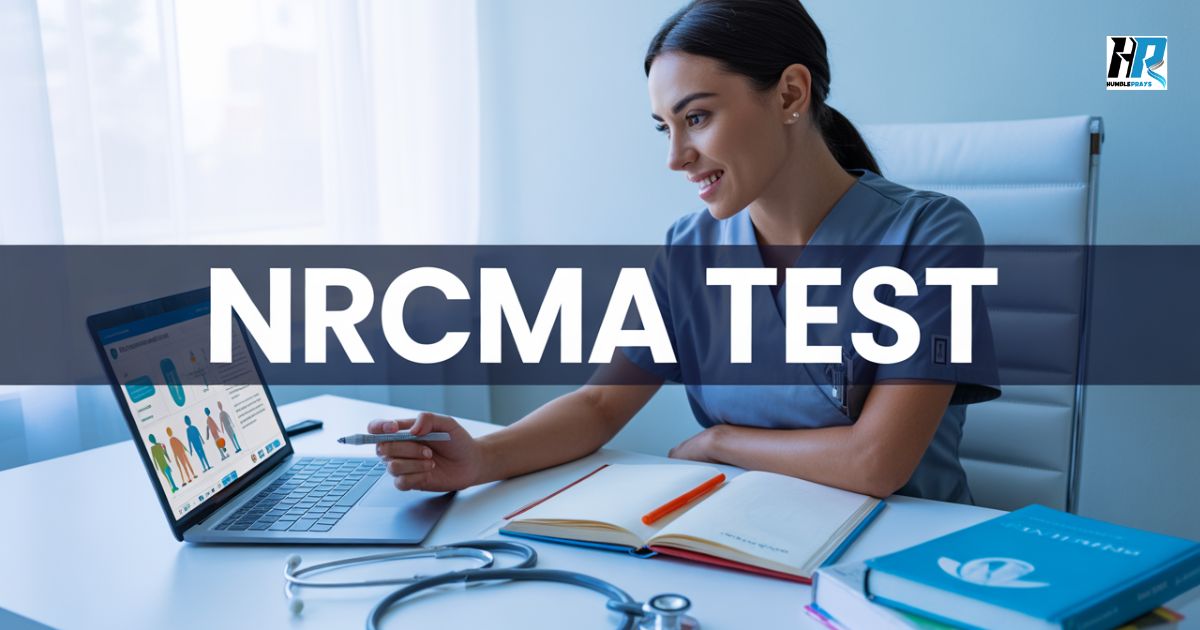One of the most crucial elements in establishing a successful healthcare profession is preparing for the NRCMA (Nationally Registered Certified Medical Assistant) test. The National Association for Health Professionals (NAHP) grants this certification, which helps you stand out in a rapidly expanding field and attests to your professionalism, technical proficiency, and medical expertise. A certified medical assistant is necessary for a stable medical profession. And passing the NRCMA test is one of the basic steps in this journey.
In this article:
We’ll walk you through a complete NRCMA Test Guide for 2025, covering the exam format, eligibility requirements, key study tips, and expert strategies to help you prepare smarter and pass confidently.
What is the NRCMA Test, and what is its importance in 2025
Understanding the NRCMA Test
The NRCMA (Nationally Registered Certified Medical Assistant) is a medical certification exam administered by the National Association for Health Professionals (NAHP). It determines your expertise, clinical skills, and administrative abilities to ensure you are qualified for a professional position as a clinical assistant.
The importance of NRCMA Certification in 2025
In 2025, this certification may have even greater significance. The healthcare industry continues to grow rapidly, creating a rising call for qualified and licensed clinical assistants.
Earning your NRCMA credential no longer handily validates your technical understanding but also indicates to employers that you meet national standards of healthcare professionalism.
How the NRCMA Test Helps You Stand Out
By passing the NRCMA exam, you may handle medical obligations consisting of patient care, record management, and medical processes. The NRCMA certification sets you apart and provides a strong competitive edge in today’s evolving healthcare landscape.
NRCMA Test Structure, Format & Requirements

NRCMA Test Format Overview
The NRCMA test follows a multiple-choice format that tests both your clinical and administrative knowledge. It is intended to judge your understanding of medical concepts, patient care, and office processes. The exam is often administered in person at certified testing locations or online under supervision. Each question requires you to apply real-world medical assistant abilities in practical circumstances.
Key Sections Covered in the NRCMA Test
The test includes five major content areas, each focusing on essential medical assistant skills:
- Clinical Medical Procedures: This portion includes queries about patient care, vital signs, and laboratory preparation.
- Administrative tasks: They include medical records, scheduling, and billing.
- Anatomy and Physiology: You will respond to questions regarding body systems and their functions.
- Medical Terminology: It focuses on perceiving crucial healthcare concepts.
- Professional Conduct & Ethics: It includes patient communication and confidentiality.
Exam Duration and Scoring System
The NRCMA test consists of 200 multiple-choice questions and is approximately completed within two hours. Each right answer increases your total score. To get certification, you must receive the NAHP’s minimum passing score of 70%. The results are usually available within a few days after completion.
Eligibility and Application Requirements
For the NRCMA examination qualification, you need to meet the following requirements:
- Completing an authorized medical assistant training programme.
Or
- One year of relevant experience in the medical profession.
- You must also show proof of education and a valid identity, and pay the exam registration cost during the application procedure.
Once approved, you can arrange your exam on the NAHP testing portal or at your training facility.
A Guide for Registering for the NRCMA Test
These are steps to register for the NRCMA (Nationally Registered Certified Medical Assistant) test and help you to secure an exam date without confusion or delays.
Step 1: Check Your Eligibility
Before applying, confirm that you fulfill the NAHP eligibility criteria. You should either complete an accredited medical assistant schooling program or have twelve months of work experience in the healthcare industry.
Step 2: Collect Required Documents
Gather your educational certificates, proof of identification (ID card or driver’s license), and any employment experience letters. These documents will help your registration process run smoothly.
Step 3: Create an NAHP Account
Visit the National Association for Health Professionals (NAHP) website and create your personal account. This account allows you to complete your application, upload documents, and track your registration status.
Step 4: Complete the NRCMA Application Form
Fill out all the details, including your training institution, contact information, and exam preference (in-person or online). Double-check for errors to avoid delays.
Step 5: Pay the Exam fee and Schedule Your Exam Date
Submit your exam registration fee using the secure payment options provided by NAHP. When your application is approved, you’ll receive an email with available test dates and locations.
How to Prepare for the NRCMA Test

Preparing for the NRCMA test takes focus, consistency, and smart time management. With the right plan and study habits, you can boost your confidence and pass the exam on your first try.
Step 1: Understand the Exam Format
Review the NRCMA exam structure. It includes the number of questions, test duration, and subject areas. This will help you to create a targeted study plan.
Step 2: Gather Reliable Study Materials
Use official NAHP resources, medical assistant textbooks, and NRCMA practice tests. Skip random online notes; focus on verified content that aligns with the 2025 exam format.
Step 3: Create a Realistic Study Schedule
Divide your preparation time by topic. Distribute extra hours to challenging sections like clinical procedures or anatomy and physiology.
Step 4: Take Regular Practice Tests
Practice tests are the most effective way to measure progress and identify areas for improvement. To increase accuracy, time yourself and examine your wrong answers to model actual exam conditions.
Step 5: Review and Revise Key Concepts
Before the exam, focus on revising medical terminology, ethics, and professional conduct. Use flashcards and summaries for quick recall of important details.
Skills That Make a Successful Certified Medical Assistant
The first step is passing the NRCMA exam. The skills that you apply to your day-to-day work as a Certified Medical Assistant (CMA) are what really make you successful. In any healthcare team, these skills help you stand out, deliver exceptional patient care, and build relationships.
1. Strong Communication Skills
Medical assistants act as a link between doctors, patients, and administrative staff. Clear communication ensures patients feel comfortable and that clinical data is shared and documented.
2. Attention to Detail
A small error in medical records or patient data can lead to major complications. Maintaining accuracy in everything from test reports to billing and scheduling is made easier by your work.
3. Clinical and Technical Competence
Successful CMAs are experienced in basic clinical tasks like measuring vital signs, preparing examination rooms, drawing blood, and assisting in minor procedures. Staying confident in your technical skills makes you an asset to any clinic or hospital.
4. Organizational and Time Management Skills
With multiple patients, doctors, and administrative tasks to handle daily, time management is crucial. Staying organized helps you work efficiently, even during busy shifts.
5. Empathy and Professionalism
Patients often come to clinics feeling anxious or unwell. A calm, empathetic attitude helps them feel cared for and respected. Pairing compassion with professionalism builds lasting patient trust.
Continuing Education and NRCMA Recertification
Earning your NRCMA certification is a major achievement, but maintaining it requires ongoing dedication. Continuing education ensures you stay current with the latest medical practices, technologies, and regulations, all of which help you deliver high-quality patient care and advance your career.
Why Continuing Education Matters
Healthcare is constantly evolving. New treatment methods, updated safety protocols, and emerging technologies mean that even experienced professionals are learning. Continuing education helps certified medical assistants stay proficient, confident, and compliant.
Best Ways to Earn Continuing Education Credits
- Attend healthcare workshops or webinars offered by accredited institutions.
- Take online CE courses focused on patient care, clinical skills, or healthcare ethics.
- Join professional associations like NAHP or AAMA for access to approved CE opportunities.
- Participate in in-clinic training or new technology sessions at your workplace.
Stay Ahead with Lifelong Learning
Recertification isn’t just a requirement; it’s an opportunity to grow. Each course or workshop adds to your knowledge, improves your efficiency, and positions you for promotions or specialized roles in healthcare.
Career Growth & Salary Outlook After NRCMA Certification
Once you’ve passed your NRCMA test, you open the door to a wide range of rewarding career opportunities in healthcare. This credential not only enhances your credibility but also positions you for better job security, higher pay, and long-term professional growth.
Career Opportunities for Certified Medical Assistants
As a certified medical assistant, you can work in diverse healthcare environments such as:
- Hospitals and Clinics – Assisting doctors, handling patient care, and managing clinical tasks.
- Private Practices – Managing front-desk duties, patient scheduling, and billing operations.
- Specialty Clinics – Working in cardiology, pediatrics, dermatology, or orthopedics.
- Laboratories and Diagnostic Centers – Performing sample collection, testing, and reporting.
Salary Outlook in 2025 and Beyond
With the growing demand for qualified medical assistants, the salary potential for NRCMA-certified professionals is steadily increasing.
Average Salary (2025 estimate): $38,000 – $50,000 per year, depending on location and experience.
Experienced CMAs: Can earn up to $55,000+ annually, especially in specialized or supervisory roles.
Top Paying States: California, Texas, Florida, and New York continue to offer the most competitive salaries for medical assistants.
Factors That Influence Salary Growth
- Level of experience and additional certifications
- Type of healthcare facility (private practice vs. hospital)
- Geographic location and demand for CMAs
- Continuing education and skill development
How to Stand Out and Succeed as a Certified Medical Assistant
Passing your NRCMA test is an incredible accomplishment, but true success comes from how you apply your knowledge, grow professionally, and make an impact in the healthcare environment. The best medical assistants go beyond technical skills; they bring dedication, adaptability, and leadership to every role.
1. Keep Learning Beyond Certification
Don’t stop after passing your exam. Stay updated with new medical practices, digital tools, and patient care techniques. Continuous learning shows initiative and keeps you competitive in an ever-evolving healthcare field.
2. Build Strong Professional Relationships
Networking is one of the most powerful tools for growth. Connect with other certified professionals, supervisors, and mentors. Join medical assistant associations, attend industry events, and engage in online healthcare communities to expand your connections and opportunities.
3. Demonstrate Leadership and Reliability
Take ownership of your responsibilities. Volunteer to mentor new staff, organize patient flow, or assist in training sessions. Leadership doesn’t always mean management — it means being dependable, proactive, and solution-oriented.
4. Master Both Clinical and Administrative Skills
Employers highly value medical assistants who can handle both sides of the job. Strengthen your expertise in clinical procedures and administrative tasks like scheduling, billing, and insurance processing. This versatility makes you an irreplaceable team member.
5. Showcase Professionalism Every Day
From punctuality to patient interactions, professionalism sets you apart. Always maintain patient confidentiality, follow ethical practices, and communicate clearly. Your attitude reflects the quality of care you provide.
Conclusion
Preparing and passing the NRCMA test is more than just an exam goal; it’s the foundation of a successful and fulfilling career in healthcare. This certification proves your skills, builds your confidence, and sets you apart in a competitive job market.
By following a focused study plan, using NRCMA practice tests, and staying committed to continuous learning, you can pass on your first attempt and start your journey as a certified medical assistant with pride.
Remember that your dedication today shapes your future tomorrow. Take the next step by scheduling your NRCMA test and opening the door to endless opportunities in the world of healthcare.
You must read: 150+ Monday Blessings And Prayers To Start New Week

